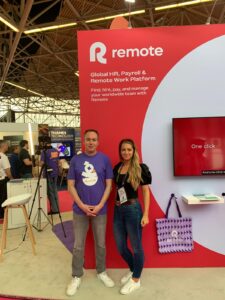Monika Liikamaa, Co-CEO and Co-Founder, Enfuce

Monika Liikamaa of Enfuce with Graham
Monika reflected on her journey, highlighting her transition from a developer to a bank CIO and eventually co-founding Enfuce with Denise Johansson. She described the motivation behind starting the company as a desire to improve processing efficiency globally. Monika acknowledged the male-dominated nature of the industry but emphasised that she didn’t dwell on it, attributing any challenges to cultural norms. She underscored the importance of breaking those barriers for future generations, citing her own children as examples of limitless potential.
Monika recounted Enfuce’s journey since 2017, starting with a modest plywood booth and expanding over the years. She highlighted recent collaborations, including one with Swile, a French employee benefits company, and another with allpay, focusing on card issuance and targeting governmental programs. Monika emphasized partnerships as a key aspect of Enfuce’s growth strategy, alongside technology and processes. She expressed a commitment to excellence and collaboration with like-minded individuals, reflecting on her motivation for founding Enfuce.
Monika spoke about the difficulties of scaling the company, particularly in terms of recruitment and maintaining a cohesive culture. She highlighted the importance of aligning values and fostering a supportive environment, echoing Peter Drucker’s sentiment that “culture eats strategy for breakfast.” Monika emphasised the evolving nature of the challenge, noting that as the company grows, so do the complexities of managing its culture. She underscored the significance of simplifying governing policies to attract and retain top talent, acknowledging the cultural stigma surrounding job transitions but advocating for a more progressive perspective.
Monika expressed gratitude for Remote, recognising its pivotal role in facilitating Enfuce’s expansion across multiple countries. She appreciated Remote’s contribution as a key enabler, making it effortless to scale up operations. Monika recounted the seamless transition to remote work during the onset of the COVID-19 pandemic, attributing it to their prior readiness for remote operations. She highlighted the ease of onboarding talent from various parts of Europe due to Remote’s support, simplifying processes such as setting up legal entities and managing hiring procedures.
Yaacov Martin, CEO, Jifiti

Yaacov Martin of Jifiti with Debbie West
Yaacov highlighted regulation as a key talking point at Money20/20, noting its increasing influence on finance and fintech. He also observed that traditional banks are now taking significant steps to enter areas previously dominated by fintechs, recognising their own market value. Regarding Jifiti, Yaacov explained that the company enables banks and financial institutions in the realm of embedded lending. He accentuated Jifiti’s role in helping these institutions leverage their regulatory status, economic resilience, and cost-effective capital to make lending more accessible, both within and beyond their traditional environments.
Yaacov explained that embedded lending empowers banks to be more customer-centric by providing financial products at critical moments outside the bank, such as during significant transactions in retail, services, education, medical procedures, and home renovation. This approach ensures customers and small businesses have access to suitable, competitive, and responsible loan products. Regarding recruitment and retention at Jifiti, Yaacov emphasised the importance of a clear purpose. He noted that maintaining a strong, focused mission helps retain staff through tough times and keeps both the workforce and partners motivated and aligned with their respective responsibilities.
Jennifer Parker, CCO, Convera

Jennifer Parker of Convera at the stand with Graham
Jennifer discussed the implications of the recently released report on fintech trends, highlighting its significance in providing actionable insights for businesses and financial institutions navigating the rapidly evolving market. Key findings included predictions of significant growth in cross-border payments revenue by 2030, a surge in B2B e-commerce, and widespread adoption of real-time payments among medium-sized businesses. Additionally, the report forecasted substantial growth in B2B cross-border transactions on blockchain by 2025, indicating a trend toward increased blockchain integration in the near future.
Acknowledging the ongoing challenges in both recruiting and retaining talent within the fintech industry, she emphasised the importance of diversifying recruitment channels and encouraged her teams to explore beyond their own networks to promote diversity and inclusivity. Jennifer underscored her belief that diversity is crucial for growth and development, striving to create a workforce that reflects the global community they serve. She expressed a commitment to fostering an environment where everyone feels valued and included. Despite the challenges, Jennifer underlined the significance of taking extra steps to find talent that aligns with the company’s values and culture.
Jennifer addressed the challenges of distributed workforces by highlighting a global strategy with local execution. She highlighted practices like peer-to-peer mentorship and forums for best practice sharing to enhance communication across teams. Jennifer stressed the importance of a strong communication strategy for consistent messaging. She also emphasised creating shared experiences to foster team culture and encouraged authenticity and learning from team members and clients to drive innovation.
Jennifer outlined Convera’s ambitious plan to double its business size over the next few years, aiming to empower tens of thousands of businesses to grow with confidence. She highlighted their ongoing digital transformation journey since 2021 and emphasized a focus on tech-led solutions. Jennifer mentioned the completion of a full migration to AWS and point out future investments in technology to propel Convera forward and better serve clients with ambitious growth goals.
Nirav Patel, CEO, Andaria

Nirav Patel of Andaria with Graham
Nirav observed that this year’s Money20/20 conference was about double the size of last year’s, reflecting the significant innovation in the industry. He noted that embedded finance was a clear theme, aligning with his ongoing focus. Nirav mentioned the industry’s evolution, particularly the shift from API-driven solutions to software development kits (SDKs), and highlighted the growing integration of payments with insurance, wealth management, and lending within the embedded finance ecosystem. He anticipated further consolidation in the space over the next year, making it an exciting area to watch.
Nirav expressed confidence in the competitive market, viewing increased competition as beneficial for mainstream acceptance, given the market’s vast potential of $30 trillion over ten years. He emphasized that their unique selling proposition and deep understanding of their target base provided security. Nirav highlighted recent activities, particularly their involvement in the Football Innovation Forum, which validated their solutions and facilitated valuable connections. He mentioned ongoing discussions with major football clubs and anticipated a strong next season. Additionally, Nirav revealed expansions into a web3 metaverse platform and an insurance company, underscoring their diverse growth and innovative embedded payment solutions.
Nirav acknowledged the challenges of recruiting and retaining talent, noting the high job transition rate in the current generation. He emphasised the need to adapt recruitment strategies and the importance of partnering with effective recruitment consultants and platforms like Remote. Nirav mentioned that their talent pool in Malta, despite being small, was valuable but limited. Personally, he was excited about the growing acceptance of embedded finance beyond the industry, highlighting the importance of clear communication and simplification of concepts.
Charles Damen, Chief Product Officer, Token io

Charles Damen of Token io with Debbie
Charles elaborated on the rise of Pay By Bank as a significant trend in the payment industry, noting its evolution since its inception in 2019. He highlighted its increasing adoption by merchants as a preferred payment method over traditional card payments, citing various applications such as paying off credit card bills and purchasing goods or services online. Charles accentuated the maturity of Pay By Bank as a payment method and its potential for widespread use across different applications. He highlighted the benefits for merchants, including lower processing costs, enhanced user experience, and heightened security due to strong customer authentication measures like face ID or touch ID. Additionally, he noted the immediacy and transparency for consumers, who can directly access their bank balance before and after transactions.
Charles provided insights into Pay by Bank and its integration process for customers to enable seamless payments. He discussed collaborating with payment providers, banks, and tech companies to integrate Pay by Bank into their offerings, simplifying distribution to merchants. He highlighted the concept of commercial variable recurring payments, enabling one-click checkout experiences and recurring payments for fixed or variable amounts. Charles emphasized the transformative nature of this payment method, involving banks to monetize premium services. Drawing parallels with Brazil’s successful Pix payment method, he advocated for collaboration between banks, Payment Initiation Service Providers (PISPs), and regulators to ensure the UK’s competitive edge in account-to-account payments.
Charles discussed the dynamics of leading a remote-first product team at Token io, highlighting the advantages of having team members spread across different locations and time zones. He emphasised the diversity this setup fosters and the flexibility it offers in employing various time zones to maintain productivity around the clock. Charles mentioned the team’s preference for in-person collaboration, utilising monthly whiteboarding sessions to brainstorm and create new features, while also organising quarterly off-site meetings to work together as a cohesive team in a single location, thus combining the benefits of both remote and in-person work environments.
Charles expressed confidence in the global potential of pay by bank, noting its increasing popularity in markets like India, Brazil, and Europe. He anticipated further expansion into markets such as the US, leveraging Token’s existing presence there. Charles put emphasis on the goal of making pay by bank a widely accepted payment method globally, offering convenience for consumers while providing benefits for merchants in terms of lower processing costs and improved conversion rates. He expressed enthusiasm for driving this initiative forward in the coming years.
Lynda Strutton, Chief Operating Officer, Tribe Payments

Lynda Strutton of Tribe Payments with Graham
Lynda described Tribe Payments as a unique entity in the payments industry, emphasizing their distinctive position in the market. She highlighted their comprehensive approach, operating across the entire payment stack. Lynda explained that Tribe’s founder, not coming from a payments background, identified a need for better payment technology while developing websites and gaming sites. This led to the creation of Tribe’s technology, initially for internal use, but later expanded to serve external clients. Tribe was officially launched at Money20/20 around six years ago, offering services in acquiring, issuing, and wallet spaces, along with value-added services.
Lynda shared insights on hyper-personalisation during her session on effectively utilizing data. Lynda clarified that while personalisation relies on past user behaviour, hyper-personalization involves real-time data analysis to anticipate future preferences. She drew parallels with platforms like Spotify and Netflix, which employ extensive data pools to tailor recommendations, highlighting the relevance of hyper-personalisation in various aspects of daily life.
Lynda observed the generational shift towards digital natives, noting her children’s reliance on digital platforms for information and their early engagement with unconventional investments like cryptocurrencies. She highlighted the challenge for traditional financial services to meet the evolving expectations of this demographic due to industry regulations and data privacy concerns. Lynda stressed the untapped potential of big data and the need for skilled professionals like data scientists to leverage it effectively. She identified legacy systems as a barrier to implementing predictive analytics and stressed the importance of investing in both talent and technology to adapt to changing consumer behaviours.
Lynda provided insights into Tribe’s workplace structure and strategy concerning distributed teams, noting its global presence with main hubs in Europe and expanding hiring in various locations worldwide to accommodate diverse customer bases across different time zones. She acknowledged the complexities that arise from operating in multiple regions, including language considerations. Lynda expressed excitement about Tribe’s strong core platform and the increasing volume of transactions from customers, anticipating significant growth in revenue over the next few years, building upon their consistent annual growth of 75 to 100%.









